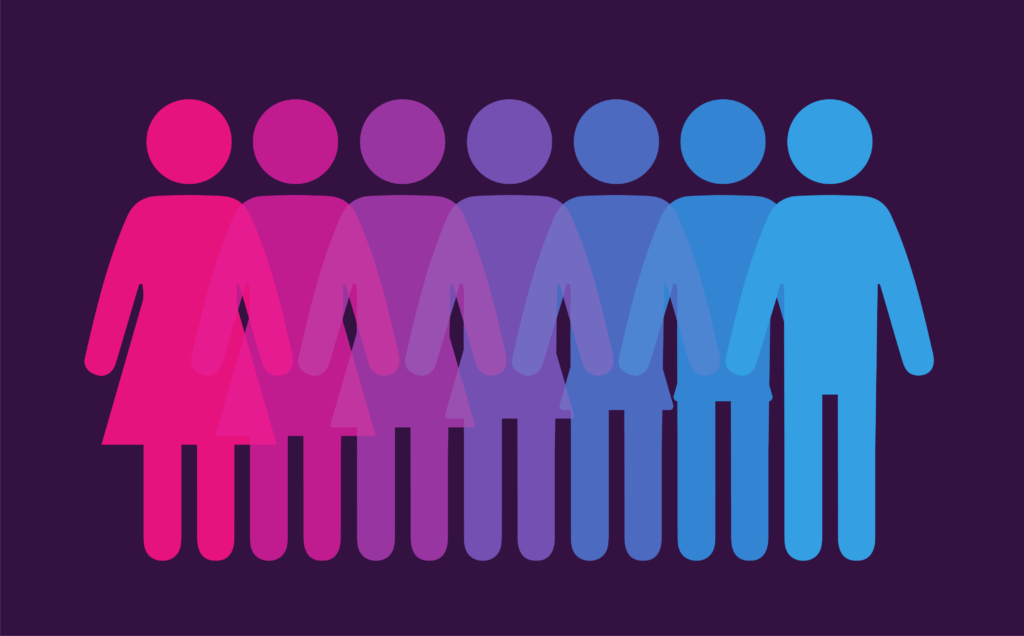Femininity: The social expectations of being a women. It refers to the qualities or attributes regarded as characteristics of women or girls in a given society.
Masculinity: The social expectations of being a man. It refers to the roles, behaviours and attributes that are considered appropriate for boys and men in a given society.
Summary
Femininity and masculinity are a binary opposite, which means they are relative terms, which mean the opposite. Another example of binary opposites are good vs evil. Binary opposition originated in Saussurean structuralist theory in Linquistics (scientific study of language). According to Ferdinand de Saussure, binary opposition is the system by which, in language and thought, two theoretical opposites are strictly defined and set off against one another. Using binary opposites can often be very helpful in generating ideas for a photographic project as it provides a framework, which provides a set of boundaries to work within.
Identity Politics
Identity politics is a term used to describe people of a particular race, religion, gender, social background, class or another identifying factor and how they are more or less venerable to oppression. Some social groups are more likely to be oppressed, such as women, ethnic minorities or sexual minorities, because they are seen to have less power or privilege. However, some people are less likely to be oppressed and are more favoured are mainly whites, or men, because they are seen to have more power or privilege.
The term was coined by the Combahee River Collective in 1977. It took on widespread usage in the early 1980s, and in the ensuing decades has been employed in myriad cases with radically different connotations dependent upon the term’s context. It has gained currency with the emergence of social activism, manifesting in various dialogues within the feminist, American civil rights, and LGBT movements, disabled groups, as well as multiple nationalist and postcolonial organizations, eg. Black Lives Matter movement.

Culture Wars
Culture wars are cultural conflicts between social groups and the struggle for dominance of their values, beliefs, and practices. It commonly refers to topics on which there is general societal disagreement and polarization in societal values is seen.
The term is commonly used to describe contemporary politics in western democracies with issues such as abortion, homosexuality, transgender rights, pornography, multiculturalism, racial viewpoints and other cultural conflicts based on values, morality, and lifestyle being described as the major political cleavage.

In the photograph above it is Grayson Perry, who goes on a Big American Road Trip, where he travels across the US, exploring its biggest fault lines, from race to class and identity, making art as he goes along. He travels to the Midwest to find folks bitterly divided over identity politics and hot issues like abortion and vaccination.


Gender Identity
Gender identity is how a person describes there gender. This is your deeply-held inner feelings as to whether you are a female, male, both or neither.

Cultural Identity
Cultural identity is a part of a person’s identity, or their self-conception and self-perception, and is related to nationality, ethnicity, religion, social class, generation, locality or any kind of social group that has its own distinct culture.

Social Identity
Social identity refers to people’s self-categorizations in relation to their group memberships (the ‘we’). These categorizations are often assigned to us or something we are born into.

Geographical Identity
An individual or group’s sense of attachment to the country, region, city, or village in which they live. It is also the key characteristics with which a particular country, region, city, or village is associated.

Political Identity
Political identity is a form of social identity marking membership of certain groups that share a common struggle for a certain form of power. This can include identification with a political party, but also positions on specific political issues, nationalism, inter-ethnic relations or more abstract ideological themes.

Lack of/ Loss of identity
The loss of identity can refer to a range of experiences in which an individual feels disconnected from their sense of self, purpose, or values. This can occur due to various factors such as major life changes, trauma, mental health issues, or societal pressures. This can also cause mental health issues for some individuals.

Stereotypes
A stereotype is a widely held, but fixed and oversimplified image or idea of a particular type of person or thing. There are many different gender stereotypes that influence femininity and masculinity. Examples:
• Women should be housewives and mothers
• Men should be tough and strong
• Women are too emotional
• Men should souly provide for the women

Prejudice
Prejudice is a favouring or dislike of something without good reason. It is having unfriendly feelings directed against an individual, a group, or a race.

